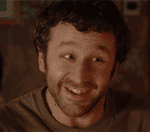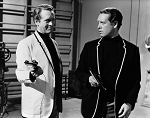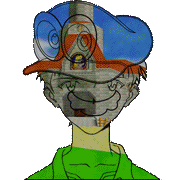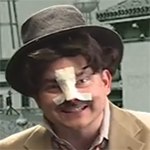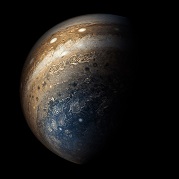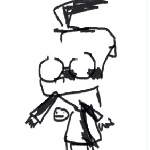|
Vagabundo posted:I've been thinking a lot about the parallels between Tarantino and Smith recently. They both hit it big on the independent scene after their debut films got picked up by the Weinsteins and both are film aficionados that went from being the audience to the content producers. To me, Tarantino is basically everything that Smith should have been, or at least aspired to be. Nah, Tarantino does what he does because he's in love with cinema, film, movies, everything. Smith is only in love with the sound of his own voice.
|
|
|
|

|
| # ? Jun 9, 2024 20:40 |
|
Yoshifan823 posted:Nah, Tarantino does what he does because he's in love with cinema, film, movies, everything. Smith is only in love with the sound of his own voice. I think you'll have a hard time arguing that Tarantino doesn't love the sound of his own voice. That's why it's better to criticize the films, which, in this case, should be really, really easy, because they're either bad or bland (which is still bad, but in a way that's easier to let go).
|
|
|
|
K. Waste posted:I think you'll have a hard time arguing that Tarantino doesn't love the sound of his own voice. That's why it's better to criticize the films, which, in this case, should be really, really easy, because they're either bad or bland (which is still bad, but in a way that's easier to let go). Oh, he absolutely does, but that's not why he makes films, it's just an added benefit.
|
|
|
|
Also, Tarantino as far as I'm aware doesn't have anywhere near the kind of web presence that smith has. I firmly believe his behaviour online has negative effects on people's attitudes towards his films.
|
|
|
|
And has for 20 years, he was one of the first big celebrities to have a Web presence.
|
|
|
|
Smith is a cinema aficionado in the sense that he really loves Star Wars and Jaws. The better parallel to make is with Richard Linklater and Jim Jarmusch. Both were huge influences on Clerks (he thanks them in the credits) but seeing how they grew as filmmakers is a lesson Smith should take. Linklater started with Slacker and Dazed & Confused, but he went on to build on his ideas and style, and has made really audacious films. Jarmusch has matured, explored deeper themes rather than continuing to focus on nothing but slackers, all the while keeping to his roots. Smith is finally trying to improve. It's clear with Red State and Tusk that he wants to do something else. But he'd much rather just sit around and think about ideas for movies rather than hone his craft.
|
|
|
|
Gaz2k21 posted:Also, Tarantino as far as I'm aware doesn't have anywhere near the kind of web presence that smith has. You mean acting like a big dingus so that people's first thought of your new movie is "poo poo it's by that dingus" is a bad idea?
|
|
|
|
Smith's movies also had the problem of feeling like they were much more about the brand than the individual story. While Tarantino has Al sorts of quirks and allusions in his stuff, his films always work as a stand alone piece and aren't really some kind of cult you have to buy into. One thing that bothered me for a while about Smith's stuff is that he had this whole stupid universe that he tried to build, or at least cross reference. However, it was all bland, forgettable stuff. His web presence and spoken word stuff probably encourages this, but then he's probably made a lot more money doing that anyways. He seems to be moving away from that entirely now, but he still doesn't write good stories.
|
|
|
|
Last Buffalo posted:Smith's movies also had the problem of feeling like they were much more about the brand than the individual story. While Tarantino has Al sorts of quirks and allusions in his stuff, his films always work as a stand alone piece and aren't really some kind of cult you have to buy into. As for Tarantino, he is five times the director Smith could ever be, but a huge chunk of his work is references. He doesn't have a brand per se, but if he did, it would be "Remember this movie I am referencing?? No, I suppose you wouldn't. I do though!!". He seems to refuse to just make a movie. Everything needs to be an homage. I like a majority of his films, but I would absolutely love for a Tarantino movie that wasn't a love letter to something else.
|
|
|
|
Last Buffalo posted:'The expanded universe comes at the expense of the individual film.' Slugworth posted:'The expanded universe is a largely incidental aspect of why his films fail.' I think it's a little of both, and, again, Chasing Amy offers a quintessential example of how. The presence of Jay and Silent Bob at the end of the film isn't just a callback to Mallrats and Clerks (Bluntman and Chronic could have worked on its own as a gag. It doesn't need to be directly connected to the diegesis of another film.) The imposition of these characters from what are ostensibly tonally and thematically different films works towards Smith's point that the kernel of wisdom comes from the most unlikely source. The same principle is applied to Dogma. Both of these movies suck, but it's not so much that the expanded universe detracts from the ability of the films to work on their own as it is that the expanded universe works as just another typical expression of Smith's unstated pretensions. It's a lot like how Tyler Perry will make both wacky comedies and broad dramas, but Madea will appear in both. The expanded universe allows both filmmakers to appeal directly to a core audience such that the relative ambitions of what they're doing become irrelevant. When Medea/Silent Bob show up in the film, this is the pinnacle of each filmmaker's brand and signature, the thing that allows them to both obfuscate serious criticism of their works, while allowing them to pander to really shallow social ideas. For Perry, it's usually the role of women and spirituality in Black American society. For Smith, it's the 'lost' Generation X trying to rediscover ideological foothold that has been lost to cynicism and ambiguity, whether this be in terms of religion, gender and sexuality, relationships, commercialization, etc. This is why Jay & Silent Bob Strikes Back is still the best of his best film, with Zack & Miri Make a Porno coming a close second. Basically, the plot of Strikes Back is the profound absurdity that Smith finds that what he views as simply being 'drawn from life' could actually become an American success story. At the same time, however, even Smith's best and most self-conscious films aren't good. He still ultimately uses Jay and Silent Bob as proxies to take revenge on the consumers who dare to tell him what he already knows and acknowledges in the film itself during the final screening, but through characters of the expanded universe. Smith's films up to Red State (which I'll refrain from commenting upon, as I haven't seen them, and don't appear to be relevant in this regard) are consciously reveling in their own mediocrity and take pleasure in mocking those who aren't satisfied with it.
|
|
|
|
Slugworth posted:As for Tarantino, he is five times the director Smith could ever be, but a huge chunk of his work is references. He doesn't have a brand per se, but if he did, it would be "Remember this movie I am referencing?? No, I suppose you wouldn't. I do though!!". He seems to refuse to just make a movie. Everything needs to be an homage. I like a majority of his films, but I would absolutely love for a Tarantino movie that wasn't a love letter to something else. I feel this way sometimes. Samuel L Jackson in his Inside the Actor's Studio interview even talked about how Tarantino's directing style is often to refer to other movies. Like, "Okay, Sam. This shot is gonna be like The Good, the Bad and the Ugly, but I want you to sorta do this thing that Warren Oates does in blah blah blah."
|
|
|
|
Vagabundo posted:I've been thinking a lot about the parallels between Tarantino and Smith recently. They both hit it big on the independent scene after their debut films got picked up by the Weinsteins and both are film aficionados that went from being the audience to the content producers. To me, Tarantino is basically everything that Smith should have been, or at least aspired to be. Tarantino has improved by leaps and bounds. Whether or not you like his style, he's gotten a whole lot better at it. He also uses his love of movies to say something about movies. Inglourious Basterds was about our relationship with war films and what they do to our sense of right and wrong. Django was about the Magical Negro character and the inherent racism of the genre.
|
|
|
|
Snowman_McK posted:Django was about the Magical Negro character and the inherent racism of the genre. I thought Django was about the false empowerment of being a gunslinger in a world of racism and literal ownership of people. Django and Schultz try to deal with racism 'rationally' by playing by the rules, buying back individual slaves, feeling bad about racism - until eventually, they can't stand it any more. I love the interplay between Candie and Stephen, and the scene with the skull. The film surmises that slaves are not merely reduced in agency but turned into slaves, as it were. I really like Django Unchained because it essentially says 'we should burn down the white house if it stands for oppression and take no prisoners doing so'. I love the 2Pac music playing over the climactic fight. I could listen to that soundtrack all day. I actually am, right now. Slugworth posted:As for Tarantino, he is five times the director Smith could ever be, but a huge chunk of his work is references. He doesn't have a brand per se, but if he did, it would be "Remember this movie I am referencing?? No, I suppose you wouldn't. I do though!!". He seems to refuse to just make a movie. Everything needs to be an homage. I like a majority of his films, but I would absolutely love for a Tarantino movie that wasn't a love letter to something else.
|
|
|
|
I've heard the way Tarantino makes films compared to the way Public Enemy made beats, and it's really spot on. Look at the Butch section from Pulp Fiction - He starts with a classic noir scenario (a la The Set-Up) with Butch throwing a boxing match but winning instead. The film then turns into an homage to Breathless, a film which was itself an homage to American film noir. He encounters Marcellus Wallace on the street in a scene ripped right out of Psycho (a film that starts with noir conventions and shifts into horror). The story then takes a turn into the Deliverance playbook and we have the scene of Butch deciding which weapon to use against Zed. Tarantino's mentioned this scene in particular "Does he choose the chainsaw and be Leatherface? Or the baseball bat like out of The Warriors? No, he chooses the samurai sword." Pulp Fiction is a post-modern neo-noir. The stories all start with classic noir conventions but they mold and change and bring in elements from all sorts of genres and eras. I can't imagine Smith even attempting something like that. His idea of a reference is to have the characters shoot the poo poo about Star Wars and Jaws. Frankly, I don't have any idea how Tarantino and Smith are comparable at all aside from both being indie filmmakers in the early 90s who got big. Reservoir Dogs, while imperfect, is a much more sophisticated film than Clerks. They're both talking heads flicks, but Reservoir Dogs is a smart crime drama full of betrayals and cruelty. Clerks, while I enjoy it, is slackers making a bunch of jokes about semen.
|
|
|
|
Hbomberguy posted:I thought Django was about the false empowerment of being a gunslinger in a world of racism and literal ownership of people. Django and Schultz try to deal with racism 'rationally' by playing by the rules, buying back individual slaves, feeling bad about racism - until eventually, they can't stand it any more. I love the interplay between Candie and Stephen, and the scene with the skull. The film surmises that slaves are not merely reduced in agency but turned into slaves, as it were. I really like Django Unchained because it essentially says 'we should burn down the white house if it stands for oppression and take no prisoners doing so'. I love the 2Pac music playing over the climactic fight. I could listen to that soundtrack all day. I actually am, right now. This is also a really good reading. To me, Django is a 'magical negro' in the sense that he's really loving good at everything he does. He's a little like a child at first, but takes to every skill even better than Schultz. By the time they get to the South, he's actually hamstrung by Schultz. They're in a world Schultz does not understand but insists on trying to control (hence the hare-brained scheme to get Bromhilda back) I saw the title referring to the moment when Schultz dies That's when Django is truly free, and from then on he's actually empowered. There is also the commentary that Schultz always gets out of trouble by waving the warrant. He doesn't talk his way out of trouble as much as he is under the protection of the law. By contrast, Django gets out of trouble with nothing but a quick wit and a long expired warrant. He has no protection under the law. He is who Schultz pretends to be. Really, there's more going on in one scene of Django than in almost everything Smith has done. That they had comparable beginnings to their careers is increasingly embarassing to Smith.
|
|
|
|
Snowman_McK posted:To me, Django is a 'magical negro' in the sense that he's really loving good at everything he does. I think Schultz is trying to help people and end slavery, but in an inoffensive way. He shoots wanted men and slave owners only when appropriate and does his best to help folks slip between the cracks - but the system itself remains oppressive. He's basically equivalent to a modern liberal. He kills people for money, but only through the strictest possible enactment of the law and never 'in cold blood' even though he most definitely has nothing but hatred for the people he deals with. If he can vote, he votes left. Django is free only in the sense that he has a really nice master - because that's basically the best you can get. Even Schultz apologises for it but deems it necessary. The key moment of change is when he's confronted with a rule he can't possibly obey - being nice and polite to a racist slave-owning monster. When it comes down to brass tacks, Schultz' honest emotions, the driving force behind his actions anyway, win out. I like that decision. The film is saying 'why didn't we do this? Why didn't we kill these fuckers?' without trying to rationalise it with statistics about intelligence or poo poo like that. Tarantino's cameo is a great self-parody too. He takes everyone's complaints about his previous cameos and ramps them up. And then he explodes. There's a deleted scene that talks explicitly about economic slavery - Tarantino is a slave too, to the leQuint Dickey Mining Company. I love you Tarantino.
|
|
|
|
Hbomberguy posted:Tarantino's cameo is a great self-parody too. He takes everyone's complaints about his previous cameos and ramps them up. And then he explodes. Also a reference, to Oliver Stone getting kamikaze'd at the end of Platoon.
|
|
|
|
It's interesting that Django Unchained is a revenge story in the same way that Inglourious Basterds is a revenge story. but with World War II, you have names and faces you can point to and hold responsible. You can murder Hitler and Goebbels and say you've destroyed the system. But with American Slavery you can't just kill one person and bring it down. It is all of society that is the issue. So Calvin Candie and Candieland becomes a symbol for it all. But destroying it doesn't actually end the issue. Slavery is ingrained into the culture. Pointing out that Django basically becomes Schultz's slave is a brilliant observation because it's so true. The system is so geared towards slavery that there's no other way but for him and Django to continue to participate in it. Django readily accepts this role as he's been taught to serve white masters since the day he was born. Tarantino does a great job of showing how the evil of slavery encompasses everything. I realize we're not really talking about Kevin Smith anymore, but there's only so much you can say about him being a lazy stoner who's too in love with his podcast.
|
|
|
|
Snowman_McK posted:I saw the title referring to the moment when Schultz dies That's when Django is truly free, and from then on he's actually empowered. Again, really fuzzy on the details, but I had it described to me in film school and it kind of blew me away.
|
|
|
|
TrixRabbi posted:It's interesting that Django Unchained is a revenge story in the same way that Inglourious Basterds is a revenge story. but with World War II, you have names and faces you can point to and hold responsible. You can murder Hitler and Goebbels and say you've destroyed the system. But with American Slavery you can't just kill one person and bring it down. It is all of society that is the issue. So Calvin Candie and Candieland becomes a symbol for it all. But destroying it doesn't actually end the issue. Slavery is ingrained into the culture. Yeah, Candieland being a symbol and not a real head of power makes the ending a little sad, but when the symbol is a big white house exploding and burning to the ground, I think a big enough statement is being made. The film specifically is pro-fighting against slavery in as militant a manner as possible, going out of its way to say the civil war is going to happen in the opening. I think the only thing the film is missing is a shot of Django on the frontlines in the civil war shooting up Feds.
|
|
|
|
My only real beef with Django Unchained was that it completely bastardizes the Sigurd/Sigfried myth and thus avoid what would have been a much more awe-inspiring and radical third-act payoff. Django dying, possibly by Schultz betraying him, and Broomhilda being the one who razes the plantation to the ground and kills everyone inside. EDIT: Reservoir Dogs is a much better example of 'theatrical' cinema than Smith's hackneyed junk. Tarantino actually has origins in theater.
|
|
|
|
My only beef is that Michael K. Williams didn't star in it.
|
|
|
|
Drunkboxer posted:My only beef is that Michael K. Williams didn't star in it. I don't know if I could see him with just a pistol. Maybe if he had like a sawed off shotgun or something, but you would lose the gunslinger attribute of Spaghetti Westerns Tarantino was going for. TrixRabbi posted:I can't imagine Smith even attempting something like that. His idea of a reference is to have the characters shoot the poo poo about Star Wars and Jaws. Frankly, I don't have any idea how Tarantino and Smith are comparable at all aside from both being indie filmmakers in the early 90s who got big. Reservoir Dogs, while imperfect, is a much more sophisticated film than Clerks. They're both talking heads flicks, but Reservoir Dogs is a smart crime drama full of betrayals and cruelty. Clerks, while I enjoy it, is slackers making a bunch of jokes about semen. Smith's biggest issue in that regards is his very limited reference and knowledge pool.
|
|
|
|
K. Waste posted:My only real beef with Django Unchained was that it completely bastardizes the Sigurd/Sigfried myth and thus avoid what would have been a much more awe-inspiring and radical third-act payoff. Django dying, possibly by Schultz betraying him, and Broomhilda being the one who razes the plantation to the ground and kills everyone inside. drat, this would have been pretty awesome, actually.
|
|
|
|
I wanted that thing Candie joked that the blacks should have do to happen. "Why don't the blacks just rise up and kill the whites?" That said, the film explores why it didn't very well. BTW, Smith also attempted to approach these ideas in Chasing Amy, and did so really badly.
|
|
|
|
Hbomberguy posted:Yeah, Candieland being a symbol and not a real head of power makes the ending a little sad, but when the symbol is a big white house exploding and burning to the ground, I think a big enough statement is being made. The film specifically is pro-fighting against slavery in as militant a manner as possible, going out of its way to say the civil war is going to happen in the opening. I think the only thing the film is missing is a shot of Django on the frontlines in the civil war shooting up Feds. Remember that Tarantino mentioned wanting to make a biopic about John Brown, specifically as a siege film set during the battle at Harper's Ferry. PassTheRemote posted:Smith's biggest issue in that regards is his very limited reference and knowledge pool. Exactly. Tarantino eats, breathes, and dreams cinema. And he paid attention while watching too. He knows that when you have Uma Thurman fighting Lucy Liu it's going to be "awesome." But he also understands how the camera, editing, and the language of cinema are what make the action work. Hbomberguy posted:I wanted that thing Candie joked that the blacks should have do to happen. "Why don't the blacks just rise up and kill the whites?" I'm pretty sure the story about Old Ben the slave shaving Candie's father every night with a straight razor is a reference to Herman Melville's Benito Cereno. Benito Cereno being about a slave ship taken over by the slaves which picks up a sailor lost at sea. They keep the appearance that everything is "normal" and that the slaves are just that: servants. There's a scene where the head slave is shaving the captain of the ship. I submitted this to penismightier's Shot Context blog back when Django came out. http://shotcontext.blogspot.com/2013/01/the-shave.html TrixRabbi fucked around with this message at 21:06 on Aug 22, 2014 |
|
|
|
Did anyone see Tusk yet? I've heard bad things!
|
|
|
|
I'd go see it just for the novelty of saying I did so, but the one theater within walking distance of my apartment won't be screening it anytime soon it seems. 
|
|
|
|
Wolfsheim posted:Did anyone see Tusk yet? I've heard bad things! Oh? I'm hearing unanimous praise for Michael Parks and nothing else. I have to admit I kinda wanna see it just to see what Justin Long looks like as a walrus.
|
|
|
|
I saw Tusk this afternoon. I thought the performances were good, and the walrus stuff is really hosed up. I thought it was too "talky". I really didn't care what the characters had to say. Michael Parks was good but some of his monologues dragged on. SO MUCH DIALOGUE! The pacing really made the movie drag on, it felt a lot longer than the suggested running time. The best line of the film? Don't say Hitler in an airport I saw this at the Arclight in Pasadena. Listening to the greeter talk about the film before the trailers started was amusing.
|
|
|
|
Saw Tusk tonight and, man, it's kind of a giant mess. The first act is actually a pretty solid little horror movie, but once all the walrus stuff starts happening, the whole thing just collapses. It strikes the right tone, but it can't overcome just how goddamn silly the concept is. I admire the intent, though. It's a much more confident film than Red State, which is honestly the best thing I can say for it. Also, pretty much any scene featuring Johnny Depp's character kills the momentum of the film dead in its tracks.
Jay Dub fucked around with this message at 03:53 on Sep 20, 2014 |
|
|
|
Jay Dub posted:Saw Tusk tonight and, man, it's kind of a giant mess. The first act is actually a pretty solid little horror movie, but once all the walrus stuff starts happening, the whole thing just collapses. It strikes the right tone, but it can't overcome just how goddamn silly the concept is. I admire the intent, though. It's a much more confident film than Red State, which is honestly the best thing I can say for it. Also, pretty much any scene featuring Johnny Depp's character kills the momentum of the film dead in its tracks. Get ready for more of that Depp character in the spin off Yoga Hosers, which is already 3/4ths completed. This weird Walrus thing made the stoner actually find some work ethic.
|
|
|
|
TheBigBudgetSequel posted:Get ready for more of that Depp character in the spin off Yoga Hosers, which is already 3/4ths completed. This weird Walrus thing made the stoner actually find some work ethic. Goddamn it.
|
|
|
|
I figured I'd throw in my two cents as someone who hasn't really shared the hate boner for Kevin Smith, thought Red State was watchable enough, and finds Justin Long strangely endearing. Tusk sucked. It sucked real bad. It was boring as poo poo, which is probably the worst possible thing it could be with the premise. I'll agree with Jay Dub that the first act was decent enough but it fell apart after that. The goofy Johnny Depp character was stupid as hell. The only thing worth seeing about the movie is Michael Parks chewing scenery and they kind of blow him all in that first act and he's just kinda in the background of the rest of the movie other than a bizarre scene with Depp and the walrus fight scene, which was actually pretty funny but by then the movie was too far gone for it to be saved. E: Also, Kevin Smith is insanely incompetent. There's this long scene of Justin Long's girlfriend monologuing directly to the camera, which is then slowly revealed to be another person who she is cheating on him with, except it's super loving obvious that it's Haley Joel Osment so I don't know why it goes so long before revealing that or even trying to obscure it at all. The scene is clearly just him experimenting for the sake of experimenting and not to better the film in any way or to any purpose. Then the whole scene where Depp explains his dumb theories about Michael Parks when we already know exactly what is happening and so there's no point to listening to him speculate other than to see his wacky character being wacky. If they had had them find Depp's character and that scene happened before the big reveal of Justin Long as a walrus then it might have been more interesting to sit through and actually served a point to build suspense. mr. mephistopheles fucked around with this message at 04:47 on Sep 20, 2014 |
|
|
|
I just got back from Tusk and I liked it. It was fun to see the spark of a movie form in real time, and then see it translated into a final product. Pretty absurd, pretty intense, often intense because of the absurdity. I'm seeing it again tomorrow with my dad.
|
|
|
|
|
You're part of the problem.
|
|
|
|
Tusk was pretty good except for [in spite of] Johnny Depp.
|
|
|
|
Jay Dub posted:It strikes the right tone, but it can't overcome just how goddamn silly the concept is. I think thats the essential heart of the film, though. The idea of a dude being so hosed up in the head that he butchers/vivisects someone* to force them to become another species is pretty disturbing. But since the other species is a walrus, it's kinda inherently funny at the same time. Walruses are big fat creatures with goofy huge tusks. It's sort of the movie's blessing and curse, to be honest. An example of it is in Depp's character. The mannerisms and stuff are silly/funny, but what he's talking about is his experiences are that of a dude who finds the corpses of the victims of a mass-murderer. As I said in General, one of the things I really dug about the film is how it didn't bother to invent scenarios where cell phones don't work or that somehow the technology fails. In Tusk, the only thing approaching that is KJO ignoring his friend's text when he's mad, which is a surprisingly natural thing to do. And when the two do notice it, they immediately involve police to find their friend. I did have a bit of a beef with the ending, though, but I think I need time to process if it's a beef or not. The climax of the film implies that Harold's last words are correct and that he finally succeeded in turning Man into Walrus. But because the ManWalrus can't talk, the barking near the end is ambigious if he's an animal barking at the dude with a shotgun, or a human begging to be killed. And the tear at the end does the same is-he-human-or-is-he-walrus thing, and doubling down on the ambiguity makes for a more difficult resolution: it's not just one moment you're questioning, but two moments. Is he Walrus in the first scene, Man in the second? Or is he Man/Walrus? Or Walrus/Walrus? Or Man/Man? * One of the legitimate holy-poo poo things in the film is the discovery that the dude has been doing this quite a few times. He didn't just realize that he's finally done his Master Plan, he's done it multiple times and his victims just didn't become Walrus enough for him. MisterBibs fucked around with this message at 09:20 on Sep 20, 2014 |
|
|
|
Jean Eric Burn posted:Tusk was pretty good except for [in spite of] Johnny Depp. He ruined every good thing the movie had going for it. There wasn't much, but I was enjoying it up until he showed up.
|
|
|
|

|
| # ? Jun 9, 2024 20:40 |
|
MisterBibs posted:I did have a bit of a beef with the ending, though, but I think I need time to process if it's a beef or not. The climax of the film implies that Harold's last words are correct and that he finally succeeded in turning Man into Walrus. But because the ManWalrus can't talk, the barking near the end is ambigious if he's an animal barking at the dude with a shotgun, or a human begging to be killed. And the tear at the end does the same is-he-human-or-is-he-walrus thing, and doubling down on the ambiguity makes for a more difficult resolution: it's not just one moment you're questioning, but two moments. Is he Walrus in the first scene, Man in the second? Or is he Man/Walrus? Or Walrus/Walrus? Or Man/Man? I assure you that, just in writing this paragraph, you have thought about this substantially more than Kevin Smith has.
|
|
|










